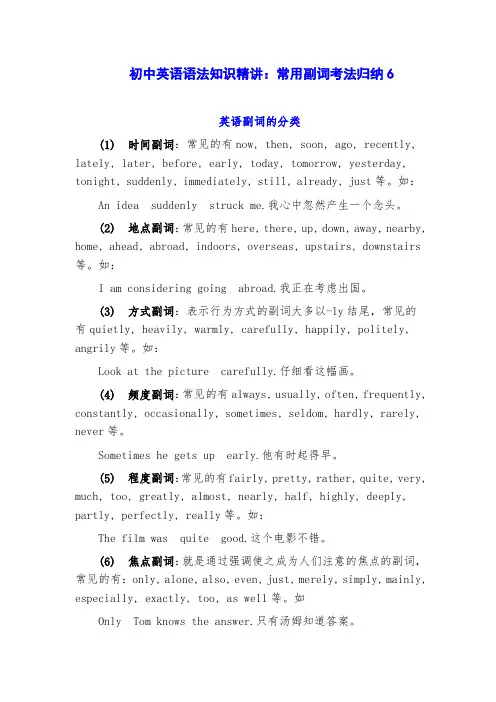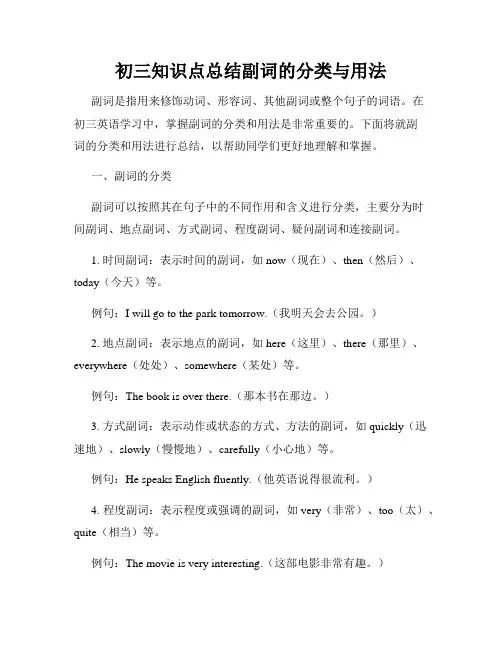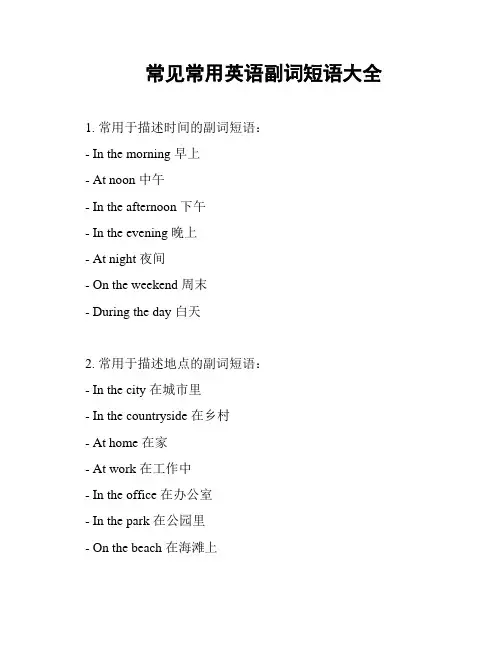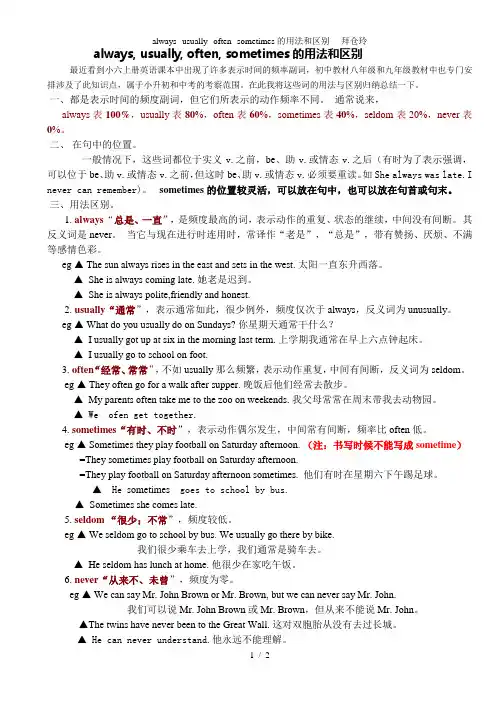英语中表示时间的副词和短语的归纳
- 格式:doc
- 大小:26.00 KB
- 文档页数:3

13、表示时态、时间的副词。
(1) 现在副词ただ今现在;ただ今会議中なので、少々お待ちください。
この頃/近ごろ/最近近来、最近;~彼には会っていない。
今や现在正是;彼は今や押しも押されもせぬ大スターだ。
(2)过去副词たった今刚才,刚刚;たった今出かけたところです。
今さっき刚才,方才;今さっき田中さんから電話があったよ。
さっき/先ほど刚才,方才;先ほど失礼しました。
この間/先日最近,前几天;この間はどうもお世話になりました。
かつて以前、曾经;その本はかつて読んだことがある。
先ごろ前几天,早些日子;先ごろアメリカから帰国しました。
(3)表示将来的副词(今后、将来、不久、过几天)これから、今後、将来、未来この先/ 先々この先(先々)どうなるだろう。
近く(近々)近く外国へ行く予定です。
表示不确定的未来。
(不久、马上、迟早、早晚有一天)今に今に景気も回復するだろう。
そのうちそのうち彼の彼の考えも変わるだろう。
やがてやがて君にも人の親になるる日が来る。
いずれ嘘をついても、いずれわかることだ。
14、表示行为成立的副词(1)表示行为成立もう已经、已;もう食事はおわりましたか。
既に已经、业已;あれからすでに一年過ぎ去った。
とっくに早就、好久以前;子供はとっくに寝ました。
もはや(事到如今)已经;君の考えはもはや時代遅れだ。
(2)表示还、尚未まだ尚、还;まだ急げば間に合うよ。
未だに还、仍然;未だに犯人の行方は分かっていない。
今もって直到如今;今もって彼から連絡がない。
(3)表示行为实现(终于、到底、好歹、好不容易、总算)ついに子供頃のからの夢がついに実現した。
とうとう随分探したが、とうとうお前を見つけた。
やっとやっと就職先が決まった。
なんとか今からなら、なんとか締切に間に合うだろう。
どうにかどうにか手術が成功した。
ようやくようやく志望校に合格できた。
(4)表示无意识行为的副词つい不知不觉、无意中;ごめん。
つい朝寝坊してしまった。


初中英语语法知识精讲:常用副词考法归纳6英语副词的分类(1) 时间副词:常见的有now, then, soon, ago, recently, lately, later, before, early, today, tomorrow, yesterday, tonight, suddenly, immediately, still, already, just等。
如:An idea suddenly struck me.我心中忽然产生一个念头。
(2) 地点副词:常见的有here, there, up, down, away, nearby, home, ahead, abroad, indoors, overseas, upstairs, downstairs 等。
如:I am considering going abroad.我正在考虑出国。
(3) 方式副词:表示行为方式的副词大多以-ly结尾,常见的有quietly, heavily, warmly, carefully, happily, politely, angrily等。
如:Look at the picture carefully.仔细看这幅画。
(4) 频度副词:常见的有always, usually, often, frequently, constantly, occasionally, sometimes, seldom, hardly, rarely, never等。
Sometimes he gets up early.他有时起得早。
(5) 程度副词:常见的有fairly, pretty, rather, quite, very, much, too, greatly, almost, nearly, half, highly, deeply, partly, perfectly, really等。
如:The film was quite good.这个电影不错。

时间副词用法
时间副词是表示时间或时间跨度的副词,常见的用法包括:
1. 表示时间跨度:这类副词有in、on、at等,用于表示时间或时间跨度。
例如,“in the morning”表示早上,“on the afternoon”表示下午,“at night”表示晚上。
2. 表示具体时间点:这类副词有now、then、often等,用于表示具体的时间点或时间间隔。
例如,“now”表示现在,“then”表示那时,“often”表示经常。
3. 表示强调:这类副词有still、already、just等,用于强调动作或状态。
例如,“still”表示仍然,“already”表示已经,“just”表示刚刚。
4. 表示惊奇:这类副词有still、already、just等,用于表达惊奇或意外的情况。
例如,“still”表示居然,“already”表示竟然,“just”表示刚刚。
需要注意的是,时间副词的位置通常位于动词之前,实意动词之后,但也有一些特殊情况,如否定句中时间副词位于助动词之前,疑问句中时间副词位于助动词之后等。
此外,还有一些时间副词可以用于其他时态或句型中,需要根据具体情况进行判断。

now的用法初中“now”是初中英语中的一个重要词汇和时间副词,它可以用于表示时间、位置、状态和情感等多个方面。
以下是一些常见的用法:表示时间:now 可以表示当前时间,用于描述正在进行的动作或状态。
例如:I'm watching TV now.(我现在正在看电视。
)表示位置:now 可以表示当前位置,用于描述人物或事物所在的位置。
例如:Where are you now?(你现在在哪里?)表示状态:now 可以表示当前状态,用于描述人物或事物的状态。
例如:I feel now as if I could run a mile.(我现在感觉好像能跑一英里。
)表示情感:now 可以表示当前情感,用于描述人物的情感状态。
例如:I'm feeling now very happy.(我现在感到非常高兴。
)除了以上用法外,“now”还可以用于句首或句尾,表示强调或引起注意。
例如:Now listen to me carefully.(现在听我说话要仔细。
)“now”是初中英语中的一个重要词汇,它有多种用法。
以下是“now”的主要用法:作为副词,表示“现在”、“此时此刻”,常用于进行时态。
例如:We are now studying English.(我们现在正在学习英语。
)作为连词,表示“既然”、“由于”、“那么”。
例如:Now you have a chance, you should seize it.(既然你有了机会,就应该抓住。
)作为名词,表示“现在”、“此刻”,通常用于复数形式。
例如:The prices now are very high.(现在物价很高。
)用于加强语气,强调现在所发生的事情。
例如:Now it's your turn to speak.(现在轮到你说了。
)在口语中,now 可以作为句子的结尾,表示催促、命令等。
例如:Quickly now!(快点!)在一些固定短语中,如“from now on”(从现在开始)、“in now and then”(时而)、“just now”(刚才)、“at now”(在现在)、“at once”(立刻)等,now 有特定的含义和用法。

初三知识点总结副词的分类与用法副词是指用来修饰动词、形容词、其他副词或整个句子的词语。
在初三英语学习中,掌握副词的分类和用法是非常重要的。
下面将就副词的分类和用法进行总结,以帮助同学们更好地理解和掌握。
一、副词的分类副词可以按照其在句子中的不同作用和含义进行分类,主要分为时间副词、地点副词、方式副词、程度副词、疑问副词和连接副词。
1. 时间副词:表示时间的副词,如now(现在)、then(然后)、today(今天)等。
例句:I will go to the park tomorrow.(我明天会去公园。
)2. 地点副词:表示地点的副词,如here(这里)、there(那里)、everywhere(处处)、somewhere(某处)等。
例句:The book is over there.(那本书在那边。
)3. 方式副词:表示动作或状态的方式、方法的副词,如quickly(迅速地)、slowly(慢慢地)、carefully(小心地)等。
例句:He speaks English fluently.(他英语说得很流利。
)4. 程度副词:表示程度或强调的副词,如very(非常)、too(太)、quite(相当)等。
例句:The movie is very interesting.(这部电影非常有趣。
)5. 疑问副词:用来引导疑问句的副词,如when(什么时候)、where(在哪里)、why(为什么)等。
例句:When did you finish your homework?(你什么时候完成作业的?)6. 连接副词:用来连接两个句子或短语的副词,如however(然而)、therefore(因此)、besides(此外)等。
例句:She is smart; however, she is not very confident.(她很聪明,然而她不太自信。
)二、副词的用法副词可以用于不同的句子结构和位置,常见的用法有以下几种。

英语副词分类详解一、时间副词1。
常见的时间副词常见的时间副词有now,then,soon,ago, recently,lately,later,finally, before,early,today tomorrow, yesterday,tonight,suddenly,immediately,already,just 等。
2. 时间副词在句中的位置(1)表确定时间的副词(如today, yesterday等)通常位于句末,有时也位于句首:He went home yesterday. / Yesterday he went home。
他昨天回家了。
而那些表示非确定时间的副词(如soon, recently, suddenly等)除可用于句末或句首外,还可位于句中(通常位于实意动词之前,动词be、助动词、情态动词之后):He went to Paris recently. / He recently went to Paris. / Recently he went to Paris. 最近他去了巴黎。
(2) still,already, just 等几个表示时间的副词通常位于句中(实意动词之前,动词be、助动词、情态动词之后):He’s just left for school。
他刚刚去学校。
I have already finished my work。
我已经做完了工作。
当要表示强调时,still和already也可位于动词be、助动词等之前:She was still [still was] beautiful at the age of forty. 她到了40岁仍然很美.I already have told him about it. 我已经把情况告诉他了。
still若用于否定句,则总是位于助动词之前:I still don’t understand what you mean. 我还是不明白你的意思。


常见常用英语副词短语大全1. 常用于描述时间的副词短语:- In the morning 早上- At noon 中午- In the afternoon 下午- In the evening 晚上- At night 夜间- On the weekend 周末- During the day 白天2. 常用于描述地点的副词短语:- In the city 在城市里- In the countryside 在乡村- At home 在家- At work 在工作中- In the office 在办公室- In the park 在公园里- On the beach 在海滩上3. 常用于描述频率的副词短语:- Often 经常- Sometimes 有时候- Always 总是- Rarely 很少- Occasionally 偶尔- Never 从不- Seldom 很少4. 常用于描述程度的副词短语:- Very 非常- Quite 相当- Extremely 极其- Absolutely 绝对地- Fairly 相当- Rather 有点儿5. 常用于描述方式的副词短语:- Carefully 小心地- Quickly 快速地- Slowly 慢慢地- Loudly 大声地- Quietly 安静地- Politely 有礼貌地- Cautiously 谨慎地6. 常用于描述结果的副词短语:- Therefore 因此- Consequently 因此- Accordingly 相应地- Thus 如此- So 因此- Hence 因此- As a result 结果7. 常用于描述顺序的副词短语:- First 首先- Secondly 第二- Finally 最后- Next 接下来- Then 然后- Lastly 最后- Previously 以前注意:文中的英语副词短语仅供参考,可以根据具体情况进行使用和变动。

always, usually, often, sometimes的用法和区别最近看到小六上册英语课本中出现了许多表示时间的频率副词,初中教材八年级和九年级教材中也专门安排涉及了此知识点,属于小升初和中考的考察范围。
在此我将这些词的用法与区别归纳总结一下。
一、都是表示时间的频度副词,但它们所表示的动作频率不同。
通常说来,always表100%,usually表80%,often表60%,sometimes表40%,seldom表20%,never表0%。
二、在句中的位置。
一般情况下,这些词都位于实义v.之前,be、助v.或情态v.之后(有时为了表示强调,可以位于be、助v.或情态v.之前,但这时be、助v.或情态v.必须要重读。
如She always was late.I never can remember)。
sometimes的位置较灵活,可以放在句中,也可以放在句首或句末。
三、用法区别。
1. always “总是、一直”,是频度最高的词,表示动作的重复、状态的继续,中间没有间断。
其反义词是never。
当它与现在进行时连用时,常译作“老是”,“总是”,带有赞扬、厌烦、不满等感情色彩。
eg ▲ The sun always rises in the east and sets in the west. 太阳一直东升西落。
▲She is always coming late. 她老是迟到。
▲She is always polite,friendly and honest.2. usually“通常”,表示通常如此,很少例外,频度仅次于always,反义词为unusually。
eg ▲ What do you usually do on Sundays? 你星期天通常干什么?▲I usually got up at six in the morning last term. 上学期我通常在早上六点钟起床。

副词时间副词种类1.确切时间:yesterday, today, now, tomorrow2.不确切时间:already, recently, lately, before, soon, then, afterwards3.副词短语:this morning, last night, in the morning, a week ago, three months ago, at once, in a while, in recent days.位置确切时间副词:句首 or 句末(更常见)(祈使句只在句末)Tomorrow I’m leaving for Beijing on a businiess tour.I’m leaving for Beiji ng on a business tour a week ago.Come to my office this afternoon.不确切时间副词:句首 or 句中 or 句末Very soon we’ll be thereWe’ll very soon be thereI have been busy recently.*before, early, immediately, late 句末Ihave never heard such a story before.He came to school late.总结:句末保险,句中的副词不多,祈使句只在句末。
地点副词种类1.表示方向:away, down, in, off, on, over, out, round, up2.表示位置:here, there, somewhere, anywhere, nowhere, everywhere介词短语:in the park, at home, in the street位置(一般:动词后)1.方向副词在地点副词之前:He often walks around in the garden after supper.2.大地点副词在后:He works in a foreign-funded company in Beijing.3.方向副词away, down, in, off, on, over, out, round, up, here, there可以倒装倒装1:副词+动态动词+名词主语Here comes the teacher.Round and round flew the plane.倒装2:副词+物主代词+动态动词Away they went.Here he comes.4.介词短语+动词+主语倒装:down, from, in, on, over, out ,of, round, upFrom the trees hang a lot of monkeys.Down this street stand a lot of shops.On the ground lies a man whose legs are broken.总结:一般句末;有些倒装结构句首。
中考英语副词知识点总结一、副词的种类副词按照其不同的语义作用,可以分为时间副词、地点副词、方式副词、程度副词、频度副词等几种主要类型。
1. 时间副词:表示时间的副词,包括now, then, soon, yesterday, today, tomorrow, always, never, often, sometimes, already, just, yet 等。
例如:He will go to Beijing tomorrow.(他明天将去北京。
)2. 地点副词:表示地点的副词,包括here, there, everywhere, nowhere, somewhere, abroad, upstairs, downstairs, outside 等。
例如:He is at home now.(他现在在家。
)3. 方式副词:表示动作方式的副词,包括quickly, slowly, well, badly, hard, easily, carefully, quietly, fast, steadily 等。
例如:She wrote the letter carefully.(她仔细地写了这封信。
)4. 程度副词:表示程度或程度比较的副词,包括very, quite, rather, too, enough, so, extremely, pretty, fairly, almost, absolutely, just, nearly, hardly 等。
例如:The apple is very sweet.(这个苹果非常甜。
)5. 频度副词:表示动作发生频度的副词,包括always, never, often, sometimes, usually, seldom, hardly, frequently,occasionally等。
例如:She always goes to school by bus.(她总是坐公交车去上学。
英语时间副词的分类与用法一、表示具体时间的副词表示具体时间的副词是指能够准确地指出动作或状态发生的时间点或时间段的副词,它们通常放在句子的末尾或句首,有时也可以放在句中。
常见的表示具体时间的副词有:副词释义例句now现在;立刻;目前;马上;其时;当时He is working now. 他现在正在工作。
today今天I have a lot of work to do today. 我今天有很多工作要做。
yesterday昨天She went to the library yesterday. 她昨天去了图书馆。
tomorrow明天We will leave for Beijing tomorrow. 我们明天将动身去北京。
tonight今晚Are you free tonight? 你今晚有空吗?二、表示时间顺序的副词表示时间顺序的副词是指能够表明动作或状态发生的先后次序的副词,它们通常放在句子的末尾或句首,有时也可以放在句中。
常见的表示时间顺序的副词有:副词释义例句then 当时;那时;接着;于是;然后;还有;而且;那么;因此He was young then. 他那时年轻。
first首先;第一First, let me introduce myself. 首先,让我自我介绍一下。
next接下来;然后Next, we will learn some new words. 接下来,我们将学习一些新单词。
finally最后;终于;完全地Finally, he agreed to help us. 最后,他同意帮助我们。
afterwards之后;后来We had lunch and went to the park afterwards. 我们吃了午饭,然后去了公园。
三、表示时间频率的副词表示时间频率的副词是指能够表明动作或状态重复发生的次数或频率的副词,它们通常放在句子的中间,位于主要动词之前,助动词或情态动词之后,be动词之后。
初中英语知识点归纳常见的副词短语用法总结一、频度副词短语(Adverbial Phrases of Frequency)1. Always(总是)例句:He always arrives early for the meeting.2. Usually(通常)例句:I usually go for a walk in the evening.3. Often(经常)例句:She often visits her grandparents on weekends.4. Sometimes(有时)例句:I sometimes forget my umbrella when it's raining.5. Occasionally(偶尔)例句:They occasionally go out for dinner on special occasions.6. Rarely(很少)例句:He rarely watches TV because he is always busy with his studies.7. Hardly ever(几乎从不)例句:She hardly ever goes to the gym, she prefers outdoor activities.8. Never(从不)例句:They never miss a chance to travel during summer vacation.二、时间副词短语(Adverbial Phrases of Time)1. In the morning/afternoon/evening(在早晨/下午/晚上)例句:I exercise in the morning before going to work.2. On weekdays/weekends(在工作日/周末)例句:I have to work on weekdays but I relax on weekends.3. At night(在晚上)例句:They like to stargaze at night in their backyard.4. By the end of(到...结束)例句:She will finish her project by the end of next week.5. In the meantime(与此同时)例句:While waiting for the bus, he read a book in the meantime.6. At the same time(同时)例句:They arrived at the party at the same time.7. From time to time(时常)例句:He visits his grandparents from time to time.8. All day/night long(整天/整晚)例句:They were dancing all night long at the party.三、地点副词短语(Adverbial Phrases of Place)1. In the park(在公园)例句:They often have picnics in the park on weekends.2. At school(在学校)例句:I met my friends at school during lunch break.3. On the beach(在海滩)例句:They love swimming and sunbathing on the beach.4. In the city/countryside(在城市/农村)例句:She enjoys the tranquility of living in the countryside.5. At home(在家)例句:He spends most of his weekends at home with his family. 6. On the way(在路上)例句:They had a great conversation on the way to the airport. 7. Across the road(在马路对面)例句:The supermarket is just across the road, it's very convenient.四、方式副词短语(Adverbial Phrases of Manner)1. In a hurry(匆忙地)例句:She left the house in a hurry because she was late for work.2. With pleasure(乐意地)例句:I will help you move next week, with pleasure.3. In a loud voice(大声地)例句:He shouted in a loud voice to get the attention of the audience.4. On purpose(故意地)例句:He spilled the drink on purpose to annoy his sister.5. By accident(偶然地)例句:I found this lost wallet by accident while walking in the park.6. In a funny way(滑稽地)例句:He imitates his teacher in a funny way and makes everyone laugh.7. In a serious manner(严肃地)例句:The teacher spoke to the students in a serious manner about their behavior.总结:副词短语在英语中起到修饰动词、形容词、副词和整个句子的作用,能够更准确地表达出时间、地点、方式和频率等信息。
英语常见副词用法详解下面是小编整理的一些英语常见副词用法详解,以供大家学习参考。
英语常见副词用法详解由于副词短语和副词的作用差不多,为了方便,我们把两者放在一起讨论,统称为“副词(短语)”,说明时间的称为“时间副词(短语)”。
一.时间副词(短语)1、副词(短语)表示的时间与动词时态的关系1) 表示过去时间的副词(短语),可和过去时的谓语动词一起用,也可和“助动词+现在完成时”构成的谓语一起用:He“came”yesterday.John“was”born in 1940.He“was” formerly( or once) a rich man.He “arrived”two days ago.He “got” married last week.He “left” Paris two weeks back.He“can't have arrived” here today week(or a week ago).He “may have left”(on) Thursday week(or Thursday of last week).The diamond “must have been stolen” on Friday before last.2) 表示现在时间的副词(短语)可以和各种时态一起用:He“is”tired now.He“is studying” music today.We“are learning” music this year.I “have done”my exercise this week.He“will do” many things today.(今天早晨讲的话)He“did” many things this year.(今年较晚时讲的话)He“has done” many things this week.(周末讲的话)3) 有些副词(短语),可和现在完成时或一般过去时的动词一起用:I“saw”(or“have seen”) him lately(or of late,recently,before,before now,all along,right along, in the past,over the years).He has just gone out.(英式)He just went out.(美式)4) 有些副词(短语),多和完成时态的动词一起用,偶尔和其他时态的动词一起用:He“has been” ill since 2 June(or ever since,since two months ago).Till now(or Up to now,Until this time)nothing“has happened”.So far(or As yet,Thus far) he“had said” nothing to me.So far he “was trying” without success.There “is” as yet no hope for peace.The guests “(had) arrived” by([=before or at] seven o'clock).5) 表示未来时间的副词(短语),必须和将来时或现在(一般或进行)时的动词一起用:He“will come” tomorrow.I“shall meet” him some day(or one day).He“will begin” his work next week.He“will call” on me in ten days(or in ten days time,ten days from now).He“will do” it soon(or shortly,presently,instantly,before long,by and by).(这6个副词及副词短语也可以和过去将来时的动词一起用:He“would do”it soon.He “would come” shortly.)He“arrives”this coming Thursday.He“is to move”(on)Friday(of)next week.He“is leaving” today week(or a week from today).He“is returning” this day month(or a month from this day).6) 个别副词(短语)可以和过去时或将来时的动词一起用:She came last Monday and he “came” the day before(or two days later).She will come next Monday,and he “will come” the day be- fore(or two days later).7) 频度副词(短语)可以和任何时态的动词一起用:He“studied”(or“had studied”,“was studying”,“studies”,“is studying”,“has studied”,“will study”)every day.He“is”always(or often,frequently,sometimes,occasion- ally,seldom,rarely,scarcely,hardly,never)ill.I“have warned” him once again(or a time or two,once in a long while,now and then,now and again,again and again,time and again,over and over again ).He will be permanently(or forever)blind.The periodical“is” published daily(or weekly,monthly,quarterly,yearly).8) 表示时间长度的副词(短语)可以和任何时态的动词一起用:He“stayed”in France(for)three years.They“gambled” all the year(round).They “gambled” all the night (thro ugh).He“started”work from 1950.He“served”his country till his death.He“will work” for me during my absence.He “can cross” the river in thirty minutes(or in a short time).We“are working” all(the) day long.The fish “will not live”over the night(or over this week).He“has done” much over the year.I “have done”nothing during the vacation.2、某些时间副词(短语)的特殊用法1) 有些时间副词(短语)的特殊用法值得注意:I shall go tomorrow(=the day after today).但:He went last Sunday,(or on the following day)(不能说I went on tomorrow).但:He went last Sunday,and I went on the previous day (or the day before)(不能说yesterday).He will go next Sunday,and I will go on the previous day(or the day be- fore)(不能说yesterday).2)I saw him three days ago(=on the third day before to- day).但:I arrived last Sunday and I informed him of my arrival three days before(=on the third day before last Sunday)(不能说three days ago).3)I shall see him in three days(=on the third day after to- day)(不要说after three days).但:I arrived last Sunday and I saw him three days later (or three days afterwards,after three days,in three days).I shall arrive on 6 July and will see him three days later(or three days afterwards,after three days,in three days).。
英语中表示时间的副词和短语的归纳(小芳)英语中表示时间的词语主要分为以下几类:时间点、时间段、动作发生的频度、动作或事件发生的先后。
一般可用单个副词来表示,也可以用带有介词in、at、on和for的短语来表示。
此外,一些不带介词的短语也可以用来表示动作(事件)发生(状态持续)的时间。
一、单个副词表示时间1. 表示动作(事件)发生的时间这类副词常见的有:ago, before, lately, later (on), now, recently, then, today, tomorrow, tonight, yesterday等。
例如:1) It’s beginning to rain now! (时间点) 现在开始下雨了!2) I haven’t seen her recently. (时间段) 最近我没见到她。
3) Will you be free tonight? (时间段) 你今晚有空吗?4) See you later. (时间点) 回头见。
2. 表示频度这类副词常见的有:always, constantly, continuously, continually, ever, frequently, generally, hardly ever, much, never, normally, occasionally(偶尔), often, periodically(定期地,偶尔), rarely, regularly, repeatedly, seldom(很少), sometimes, usually, now and then(偶尔,有时)等。
例如:1) Tom is constantly changing her mind. (频度副词constantly)汤姆老是改变主意。
2) They do meet now and then, but not regularly. (频度副词regularly)他们确实偶尔也见面,但不经常。
八年级常用的副词知识点副词是我们日常生活和学习中经常使用的一种词类,它可以修饰动词、形容词、副词,表示时间、地点、程度、方式等语法意义。
在英语中,副词属于比较难掌握的语法知识点之一,因此在八年级英语学习中也是一个重要的内容。
下面就跟随本文,了解一下八年级常用的副词知识点吧!一、修饰动词的副词1. 时间副词时间副词主要用来表示动作发生的时间或频率,如:always(总是)、often(经常)、usually(通常)、sometimes(有时)、rarely(很少)、never(从不)等。
例如:He always studies hard.(他总是努力学习。
)She never misses a class.(她从不缺课。
)2. 地点副词地点副词主要用来表示动作发生的位置或方向,如:here(这里)、there(那里)、up(向上)、down(向下)、in(在里面)、out(在外面)等。
例如:He put the book down on the table.(他把书放在桌子上。
)She walked into the room.(她走进了房间。
)3. 程度副词程度副词主要用来表示动作的强度或程度,如:very(非常)、quite(相当)、too(过于)、enough(足够)、almost(几乎)等。
例如:She is very good at singing.(她唱歌非常好。
)He is almost as tall as his father.(他和他的父亲差不多一样高。
)二、修饰形容词的副词1. 程度副词前面已经提到了,程度副词可以不仅可以修饰动词,还可以修饰形容词。
用来表示形容词的程度,如:very(非常)、quite(相当)、too(过于)、pretty(相当)等。
例如:She is very beautiful.(她很漂亮。
)He is pretty smart.(他相当聪明。
)2. 形容词副词形容词副词是一种特殊的副词,它是由形容词加“-ly”构成,其作用和副词相似,例如:slowly(慢慢地)、quickly(快速地)、happily(开心地)、sadly(悲伤地)等。
英语中表示时间的副词和短语的归纳(小芳)英语中表示时间的词语主要分为以下几类:时间点、时间段、动作发生的频度、动作或事件发生的先后。
一般可用单个副词来表示,也可以用带有介词in、 at、on和for的短语来表示。
此外,一些不带介词的短语也可以用来表示动作(事件)发生(状态持续)的时间。
一、单个副词表示时间1. 表示动作(事件)发生的时间这类副词常见的有:ago, before, lately, later (on), now, recently, then, today, tomorrow, tonight, yesterday等。
例如:1) It’s beginning to rain now! (时间点) 现在开始下雨了!2) I haven’t seen her recently. (时间段) 最近我没见到她。
3) Will you be free tonight (时间段) 你今晚有空吗4) See you later. (时间点) 回头见。
2. 表示频度这类副词常见的有:always, constantly, continuously, continually, ever, frequently, generally, hardly ever, much, never, normally, occasionally(偶尔), often, periodically(定期地,偶尔), rarely, regularly, repeatedly, seldom(很少), sometimes, usually, now and then(偶尔,有时)等。
例如:1) Tom is constantly changing her mind. (频度副词constantly)汤姆老是改变主意。
2) They do meet now and then, but not regularly. (频度副词regularly)他们确实偶尔也见面,但不经常。
3) Mary rarely left her room. (频度副词rarely)玛丽很少离开她的房间。
3. 其他一些表示时间的副词主要有:already, early, finally, first, immediately, just, late, long, presently, shortly, since, soon, yet等。
例如:1) I’ll be back presently(shortly). 我一会儿就回来。
2) What decision did you finally arrive at 你们最后做出了什么决定3) Nancy was up early. 南希很早就起来了。
4) He has just had an operation. 他刚动过手术。
【分析】句1)中的presently (shortly)(不久,一会儿),强调从现在算起到将来的某一时刻,时间持续很短;句2)中的finally(最终)强调事件的最终结果;句3)中的early(早)表示动作发生的时间比通常所认定的时间早;句4)中的just表示从过去的某个时间算起到现在,时间持续很短。
二、前面带有介词in, at, on和for表示时间的短语1. 带有介词in的时间短语in a flash(瞬时), in a lucky hour(在幸运时刻), in an evil hour(在不幸的时刻), in a minute, in a second, in a short time, in a while, in advance(预先), in an instant, in broad day(在大白天), in due course(及时地), in future, in good season(及时地), in no time(马上), in one’s childhood, in one’s spare time, in one’s teens, in one’s youth, in re-cent years, in some cases(有时候), in spring, in the beginning,in the daytime, in the end, in the long run(最后), in the meantime, in the morning, in the past, in this period, in those days, in time等。
例如:1)He was born in1980. 他生于1980年。
2)The policeman arrived in time and caught the thief in a flash.警察及时赶到,瞬时抓住了那个小偷。
2. 带有介词on的时间短语on a certain day, on Christmas Day, on night shift, on one’s birthday, on schedule(按时), on Sunday, on the moment, on that date, on the eve of, on the following day, on the Monday morning, on the New Year’s Eve, on the point of(正在……时候),on this day, on this occasion, on time等。
例如:1) There are varieties of celebrations on Christmas Day.圣诞节那天有多种庆祝活动。
2) When he heard the bad news, he burst into tears on the moment.听到那个坏消息,他的眼泪立刻夺眶而出。
3) He always arrives on time in time of an appointment.约会时他总是很准时。
3. 带有介词at的时间短语at a time(在某时), at a wedding(婚礼), at all times(一直), at any moment, at Christmas, at dark (天黑时), at dawn(在黎明), at daybreak, at dinner-time, at dusk(在黄昏), at first sight, at first, at last, at night, at nightfall, at noon, at present, at six o’clock, at sunrise, at sunset, at that moment, at that time, at the age of, at the beginning of , at the end of, at the last minute, at the moment, at the same time, at the stage(眼下), at the start, at this point(此时), at this sea-son, at times(有时)等。
例如:1)At that time, Mary earned so little money that she could hardly afford a coat like this.那时玛丽挣钱很少,几乎买不起这样一件大衣。
2)At times, Robert is seen to be walking along with a beautiful girl.有时可以看到罗伯特和一个漂亮女孩走在一起。
3)At the stage, Tom doesn’t have enough time to write such a long paper.眼下汤姆没有时间写那么长的一篇论文。
【分析】句1)中的at that time(那时)表示某种境遇存在的时间段;句2)中的at times(有时)表示事件发生的频度;句3)中的at the stage(眼下)表示离说话前后不久的一段时间。
4.“介词for + 表示时间的名词短语”表示动作持续或状态存在的时间段:for ten seconds, for five minutes, for an hour, for two days, for six months, for a year, for a decade, for a whole century, for a long time, for a short while 等。
例如:1) On hearing the news, Helen stood there for ten seconds without saying a word.听到这个消息后,海伦站在那里十秒钟没说出一句话来。
2) I feel as if I had left school for a whole century.我觉得我好像离开学校整整一个世纪了。
三、不带介词的表示时间的短语just now, so far, last night, right away, the day after tomorrow, the day beforeyesterday, five days ago, five days before, this week, next week, a week ago, a week before, last month, next month, this year, next year, three months ago, this century, last century等。
例如:1)The old couple haven’t heard from their son so far.那对老夫妇目前还没收到儿子的来信。
2) Susan will take the college entrance examination the day after tomorrow.苏姗后天要参加大学入学考试。
3) He said his father had died three years before. 他说他父亲三年前去世了。
【分析】句1)中的so far(到目前为止)是副词短语,表示到现在为止的时间段;句2)中的the day after tomorrow(后天)表示事件将要发生的时间;句3)中的three years before(三年前)表示过去某件事发生的时间,用于间接引语中。